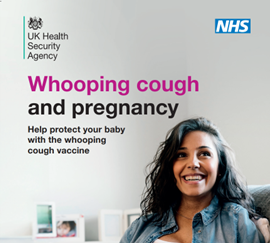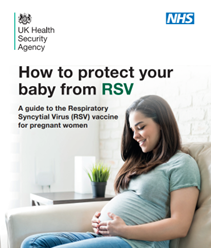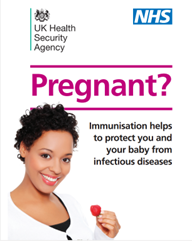Vaccinations in Pregnancy
Pregnant women will be offered vaccinations to protect them against:
- Whooping Cough (Pertussis) at 20 weeks pregnant.
- Respiratory Syncytial Virus (RSV) at 28 weeks pregnant.
- Flu at any point in pregnancy, during the flu season over Autumn and Winter.
Whooping Cough (Pertussis)
Whooping cough (also known as pertussis) is an infection of the lungs and breathing tubes. It causes long bursts of coughing and choking, making it hard to breathe. It can be a serious illness for young infants.
The best way to protect young infants from whooping cough is for pregnant women to be vaccinated at around 20 weeks of their pregnancy. This will protect babies from whooping cough until they are old enough to have their own vaccinations as part of the childhood routine vaccination schedule starting at 8 weeks old.
The pertussis vaccination is given as a single dose and is needed in every pregnancy. It is important to get this as close as possible to 20 weeks of pregnancy for the best protection.
The pertussis vaccination will be given in your GP practice. If you are more than 20 weeks pregnant and have not yet had this, it is important to contact your GP to book your appointment. It is never too late to catch up on any missed vaccinations.
 The whooping cough and pregnancy leaflet provides in depth information on the importance of the vaccination, how it protects your baby and how you can access it.
The whooping cough and pregnancy leaflet provides in depth information on the importance of the vaccination, how it protects your baby and how you can access it.
Respiratory syncytial virus (RSV)
Respiratory syncytial virus (RSV) is a common cause of coughs and colds.
In infants RSV can result in a type of chest infection called bronchiolitis. This can be serious for young infants causing breathing problems. Every year in the UK, 30,000 children need hospital treatment for RSV.
A vaccination is now available for pregnant women to protect babies from RSV for the first few months after they are born.
The RSV vaccination is given as a single dose and is needed in every pregnancy. It is important to get the vaccination as close as possible to 28 weeks of pregnancy for the best protection.
This is offered to pregnant women at around 28 weeks of pregnancy and is given by maternity services or GP practices. If you are over 28 weeks pregnant and have not received your RSV vaccination you can contact your maternity service or GP practice to book an appointment. It is never too late to catch up on any missed vaccinations.
 This guide to the RSV vaccination for pregnant women provides information about the new vaccination and why it is important to have it. The leaflet is available in a range of languages.
This guide to the RSV vaccination for pregnant women provides information about the new vaccination and why it is important to have it. The leaflet is available in a range of languages.
Influenza (flu)
During pregnancy it is more difficult to fight off infections such as the flu which can make pregnant women seriously ill.
Flu vaccinations are offered from the autumn and throughout the winter months each year. It is important for pregnant women to have the flu vaccination during pregnancy. This can be given at any time from conception to birth but having it as soon as it is offered will provide the best protection.
Having the flu vaccination protects pregnant woman whilst also passing on some protection to their baby. This protection lasts for the first few months after birth when infants are at higher risk from flu.
Flu vaccinations are provided at:
- GP surgeries
- Local pharmacies that offer NHS flu vaccination (you need to be 18 or over to access this)
- In some areas you might be able to get a flu vaccine through maternity services.
 The how to help protect you and your baby leaflet provides information about the flu and other maternal vaccinations. The leaflet is available in a range of languages.
The how to help protect you and your baby leaflet provides information about the flu and other maternal vaccinations. The leaflet is available in a range of languages.
It is important to have your vaccinations in pregnancy in line with the schedule to provide you and your baby with the best protection.
If you have missed any of your vaccinations in pregnancy speak to your maternity team or your GP for more information or to book an appointment.
All vaccines are provided free by the National Health Service (NHS)
For further information and support, please visit www.nhs.uk/pregnancy/keeping-well/vaccinations.



